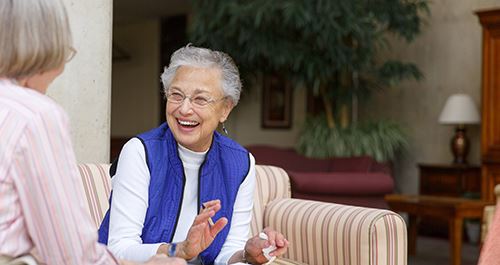
Healthy relationships are necessary at every age, but the importance of socialization for seniors cannot be overstated. Research has proven that socialization among the elderly has multiple benefits. It improves quality of life and prevents cognitive decline, such as memory loss, Alzheimer’s disease, and other forms of dementia.
The Benefits of Socialization for Seniors
Older adults with a fulfilling social life tend to be better off. They are less likely to experience avoid many of the physical, cognitive and emotional difficulties. In contrast, that seniors who are socially isolated encountermay face these issues.
A study from Harvard Medical School found that seniors who have strong social lives benefit in multiple ways. They have higher levels of physical activity, more positive moods, and fewer negative feelings.
A Penn State study found that seniors who regularly socialize with family and friends achieve better results in cognitive tests than those who don’t.
The American Journal of Public Health reported on the cognitive benefits of having a social network for older women. Studies showed that these women had reduced risk of dementia. Additionally, any cognitive impairment was delayed or prevented. There are a number of important ways that socialization can improve senior health, as explained by LiveStrong:
Evidently, socialization can provide a tremendous boost to a senior’s mental health. Positive social interactions on a consistent basis help keep older adults stimulated, mentally sharp, and intellectually engaged. Importantly, when these social interactions include activities like exercise classes, the benefits of both are increased significantly.
Additional benefits of socialization for seniors include:
- Longer lifespan. Those with high levels of socialization can live longer.
- Reduced stress. Older adults who are socially active tend to handle stress better, which can result in better cardiovascular health and an improved immune system.
- Longer lifespan. High levels of socialization in seniors help increase longevity.
- Better fitness. Older adults with diverse social supports are more likely to exercise regularly.
- Reduced risk of anxiety and depression. Consistent socialization reduces the likelihood of experiencing the anxiety and depression caused by senior isolation.
- Greater self-esteem. Socialization helps seniors maintain their self-esteem and sense of worth
How Does Social Isolation Affect the Elderly?
Now that we understand the importance of socialization for seniors, it’s necessary to know the negative affects of social isolation on the elderly. The National Council on Aging acknowledges that social isolation and loneliness negatively affects the health of seniors and can even increase the risk of mortality by 50% - higher than the impacts of obesity and alcohol abuse. They also note that socially isolated seniors are at a higher risk of:
- High blood pressure
- Heart disease
- Obesity
- Weakened immune system
- Anxiety
- Depression
- Cognitive decline
- Alzheimer’s disease
To prevent these consequences, it’s important to understand the obstacles seniors face when it comes to socialization, so they can be addressed sooner than later.
Obstacles to Senior Socialization
The most reported difficulties seniors face when combatting social isolation include:
- Physical ailments
- Loss of a spouse or other loved one
- Isolation and/or mobility problems
- Real or perceived cognitive decline
- Less availability of family members to assist with social activities
Older adults and their families face various challenges. Some may be harder to overcome than others. It’s important to work to reduce these obstacles as much as they can. Otherwise, it will be more difficult to cultivate a social life that delivers so many benefits.
Without intervention, this can quickly develop into a vicious cycle that is difficult to escape. It’s important to get involved early on before any of the above obstacles become rooted in our senior loved one’s lives.
Fortunately, it’s never too late. There are always positive ways to intervene, no matter how far the problem has progressed.
6 Ways Seniors Can Cultivate a Healthy Social Life

For many older adults, continued socialization doesn’t happen on its own. Below are 6 ways that seniors can cultivate a healthy social life. Loved ones can help by ensuring that older adults have adequate transportation.
- Build and maintain positive relationships with grandchildren.
- Do volunteer work (this has the added benefit of keeping us busy and engaged during retirement).
- Take advantage of community resources such as senior centers and religious organizations.
- Move to a retirement community. Many offer one bedroom apartments at reasonable rates that still provide access to full schedules of activities and socialization opportunities.
- Organize social activities on your own and include seniors who might be experiencing isolation or loneliness such as a book club or art class.
- Help maintain a sense of purpose by caring for a pet, church attendance or the pursuit of hobbies and interests.
- Loves ones: Ensure that older adults have adequate transportation to and from social activities.
How an Acts Retirement-Life Community Can Help
Hopefully, the above information is helpful to you or your loved one’s social life. If nothing else, we at least hope you take away the following truth: There are huge benefits of socialization for seniors, and a healthy social life is both necessary and obtainable for every older adult in our lives.
The best ways to create a healthy social life depend on you and your family’s unique situation. Unfortunately, sometimes it can be difficult for families to provide the necessary social support. And sometimes we don’t want to feel like a burden. When this happens, it might be time to seek professional help.
Here’s where we can help. All of the activities at our retirement communities are designed to create a thriving social life. There are many opportunities for consistent positive social interactions at all of our communities. This gives older adults the socialization they need.
All Acts communities also offer well-priced one bedroom apartments for single seniors who want to benefit from the great social amenities without paying for unneeded extra living space.
We’re here for you and your family whenever you need us. Please contact us with any questions or for more information on our many services.






